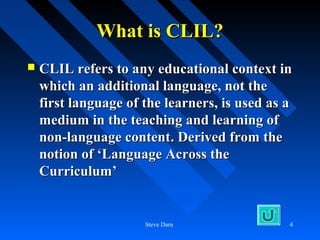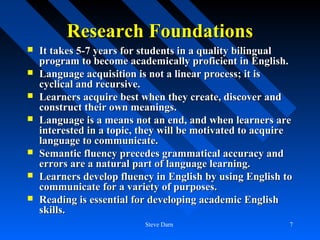CLIL
- 1. CLIL Content and Language Integrated Learning Steve Darn 1
- 2. Common Questions What is CLIL? How does CLIL benefit learners? What are the underlying principles of CLIL? What’s different about CLIL lessons? How do I become a CLIL teacher? Are there any available resources? Where can I find out more? Steve Darn 2
- 3. Example of CLIL class Steve Darn 3
- 4. What is CLIL? CLIL refers to any educational context in which an additional language, not the first language of the learners, is used as a medium in the teaching and learning of non-language content. Derived from the notion of ‘Language Across the Curriculum’ Steve Darn 4
- 5. Why CLIL? Successful language learning can be achieved when people have the opportunity to experience real-life situations in which they can acquire the language. CLIL is a more natural situation for language development which builds on other forms of learning. This natural use of language can enhance a learner’s motivation towards learning languages. This naturalness is crucial for CLIL’s importance and success in relation to both language and other subject learning. Steve Darn 5
- 6. Steve Darn 6
- 7. Research Foundations It takes 5-7 years for students in a quality bilingual program to become academically proficient in English. Language acquisition is not a linear process; it is cyclical and recursive. Learners acquire best when they create, discover and construct their own meanings. Language is a means not an end, and when learners are interested in a topic, they will be motivated to acquire language to communicate. Semantic fluency precedes grammatical accuracy and errors are a natural part of language learning. Learners develop fluency in English by using English to communicate for a variety of purposes. Reading is essential for developing academic English skills. Steve Darn 7
- 8. CLIL Principles CONTENT Progression in knowledge, skills and understanding related to specific elements of a defined curriculum. COMMUNICATION Using language to learn - whilst learning to use language. COGNITION Developing thinking skills which link concept formation, understanding and language CULTURE Exposure to alternative perspectives and shared understandings. Steve Darn 8
- 9. Further Information The CLIL Compendium www.clilcompendium.com Euroclic www.euroclic.net Translanguage in Europe www.tieclil.org UK National Centre for languages www.cilt.org.uk NILE www.nile-elt.com FACT www.factworld.info/uk Steve Darn 9
- 10. Further Information The CLIL Compendium www.clilcompendium.com Euroclic www.euroclic.net Translanguage in Europe www.tieclil.org UK National Centre for languages www.cilt.org.uk NILE www.nile-elt.com FACT www.factworld.info/uk Steve Darn 9









